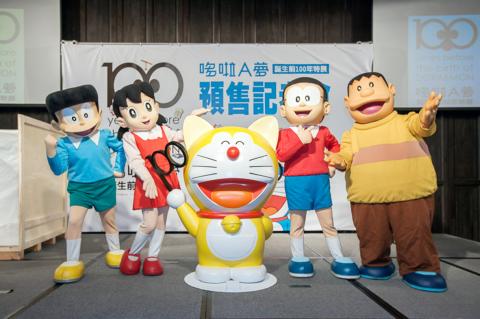Following a tour to Hong Kong earlier this year, Doraemon, the earless Japanese cartoon cat from the future, has arrived in Taiwan to celebrate his birthday (albeit 100 years early), stirring up great excitement in the local anime community.
Like all superstars, Doraemon will be making a grand appearance. The blue feline is greeting his fans with 101 life-size figurines of himself and a collection of gadgets only seen in manga series — bamboo-copter, invisible clock, time machine and anywhere door, just to name a few.
Though Doraemon won’t be born until 2112, his popularity has already prompted anime fans all over the world to throw parties for him in 2012, which marks the one hundred year countdown to his birthday. Taiwan, with approximately 500,000 fans, will join the league.

Photo Courtesy of Gold Media Group
At the “100 Years Before the Birth of Doraemon” celebration at Songshan Cultural and Creative Park (松山文創園區), children and adults will have a chance to meet the round bodied robot cat up close and learn about his early life, when he was yellow in color, had ears and higher voice.
Manuscripts of Fujiko F. Fujio, who created Doraemon in 1970, and Doraemon-inspired artworks from 40 designers will also be displayed at the venue.
Doraemon was sent back in time from the 22nd century by a young boy to aid his grandfather Nobita Nobi. Equipped with innovative, high-tech gadgets, Doraemon was able to save Nobi from trouble and make his life easier. Although the episodes are comic, they also convey messages of value, love and education.
Doraemon is more than a cartoon, said Yang Da-de (楊大德), a manager from Gold Media Group, the organizer of the event.
“[Doraemon] always pulls out gadgets from his fourth-dimensional pocket to help Nobi and friends. The manga itself not only portrays friendships but also dreams for a better future,” Yang said.
Forty years after publication, Doraemon’s impact has already exceeded the author’s original expectations. In 2002, Doraemon was named an Asian hero. Eight years later, he was appointed as Japan’s anime ambassador.

Last week the story of the giant illegal crater dug in Kaohsiung’s Meinong District (美濃) emerged into the public consciousness. The site was used for sand and gravel extraction, and then filled with construction waste. Locals referred to it sardonically as the “Meinong Grand Canyon,” according to media reports, because it was 2 hectares in length and 10 meters deep. The land involved included both state-owned and local farm land. Local media said that the site had generated NT$300 million in profits, against fines of a few million and the loss of some excavators. OFFICIAL CORRUPTION? The site had been seized

Next week, candidates will officially register to run for chair of the Chinese Nationalist Party (KMT). By the end of Friday, we will know who has registered for the Oct. 18 election. The number of declared candidates has been fluctuating daily. Some candidates registering may be disqualified, so the final list may be in flux for weeks. The list of likely candidates ranges from deep blue to deeper blue to deepest blue, bordering on red (pro-Chinese Communist Party, CCP). Unless current Chairman Eric Chu (朱立倫) can be convinced to run for re-election, the party looks likely to shift towards more hardline

Sept. 15 to Sept. 21 A Bhutanese princess caught at Taoyuan Airport with 22 rhino horns — worth about NT$31 million today — might have been just another curious front-page story. But the Sept. 17, 1993 incident came at a sensitive moment. Taiwan, dubbed “Die-wan” by the British conservationist group Environmental Investigation Agency (EIA), was under international fire for being a major hub for rhino horn. Just 10 days earlier, US secretary of the interior Bruce Babbitt had recommended sanctions against Taiwan for its “failure to end its participation in rhinoceros horn trade.” Even though Taiwan had restricted imports since 1985 and enacted

The depressing numbers continue to pile up, like casualty lists after a lost battle. This week, after the government announced the 19th straight month of population decline, the Ministry of the Interior said that Taiwan is expected to lose 6.67 million workers in two waves of retirement over the next 15 years. According to the Ministry of Labor (MOL), Taiwan has a workforce of 11.6 million (as of July). The over-15 population was 20.244 million last year. EARLY RETIREMENT Early retirement is going to make these waves a tsunami. According to the Directorate General of Budget Accounting and Statistics (DGBAS), the